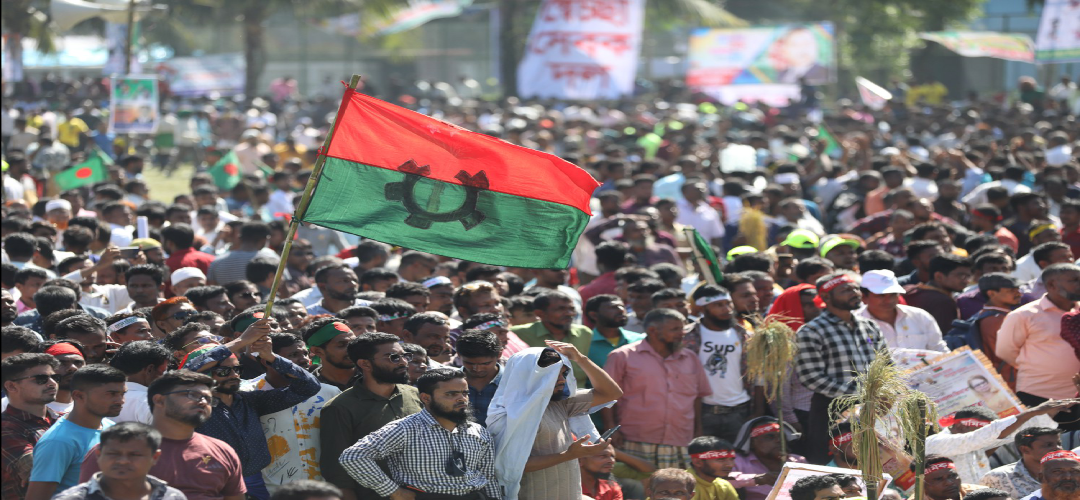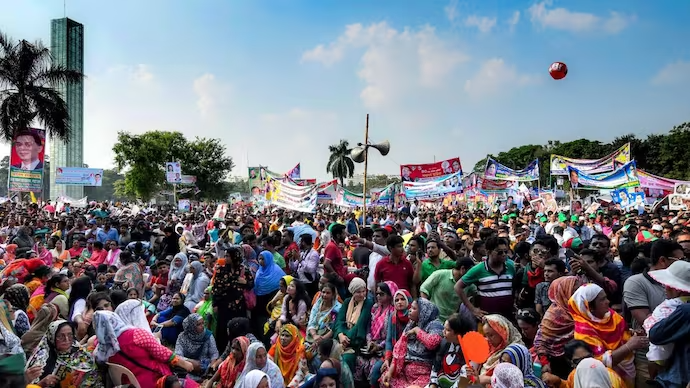Bangladesh Elections: How Free & Fair?
December 9, 2023 | Expert Insights

As Bangladesh approaches its 12th general election scheduled for January 7, 2024, the political landscape is turbulent and rife with controversy and accusations. The main opposition party, the Bangladesh Nationalist Party (BNP), has declared a boycott, alleging a lack of transparency and a government crackdown on dissent.
Background
The current storm brewing around the 2024 Bangladesh elections did not appear magically. Its roots lie deep in the contested past, specifically the 2008 and 2014 elections, both won by the Awami League (AL) but marred by allegations of irregularities and violence. These events sowed seeds of distrust that poisoned today's political landscape
After a period of military rule, the AL's victory in the 2008 elections was initially seen as a step towards a democratic revival. However, the euphoria quickly faded as allegations of vote rigging and intimidation surfaced. The opposition, led by the BNP, claimed widespread voter fraud, including ballot stuffing and manipulation of voter lists. They also accused the government of using security forces to intimidate voters and prevent them from exercising their franchise. Despite visible concerns, the 2008 elections were ultimately deemed credible by international observers. However, the seeds of doubt had been planted. The opposition's grievances were not adequately addressed, leaving a sense of injustice and resentment that would fester over the years.
The 2014 elections further eroded public faith in the electoral process. The BNP and other opposition parties boycotted the polls, citing a lack of trust in the government and its commitment to a free and fair election. This unprecedented move left the field largely open for the Awami League, leading to a landslide victory.
However, it underscored the deep divisions within the political sphere and raised serious questions about the legitimacy of the government's mandate. The international community was far less forgiving towards the 2014 elections. Concerns about the BNP's boycott, the lack of a competitive race, and reports of intimidation and violence led to widespread criticism. This further delegitimized the government's victory and heightened the perception of a flawed electoral system.
The seeds of the 2024 storm were sown years ago. Addressing the legacy of contested elections is crucial to restoring faith in the democratic process and ensuring a peaceful and legitimate outcome in 2024. This requires a genuine commitment to transparency, accountability, and inclusivity, ensuring that all parties have a fair chance to participate and compete. Only then can Bangladesh overcome the ghosts of its electoral past and build a stronger, more democratic future.

Analysis
In the lead-up to the 2024 elections in Bangladesh, the BNP raised serious concerns about the fairness of the electoral process. They allege a crackdown on dissent, citing arbitrary arrests, harassment, and intimidation, which has created a climate of fear and stifled political discourse. According to the BNP, independent media outlets face increasing pressure, leading to self-censorship and a lack of critical reporting on the ruling party. The BNP further claims manipulation of the voter list to favour the AL, raising concerns about the potential disenfranchisement of opposition voters. Accusations of using state institutions like the police and judiciary for political interests add to the BNP's contention. In response to these allegations, the BNP called for an election boycott and establishing a neutral caretaker government.
Complicating the situation is an international dimension involving the United States and Russia. The U.S. expresses concern about the political climate, urging the government to ensure a free and fair election while accusing Russia of supporting the BNP. Russia denies these allegations and accuses the U.S. of trying to undermine the Bangladeshi government, escalating tensions between the two global powers.
The BNP and its supporters assert that Prime Minister Sheikh Hasina is exhibiting authoritarian tendencies, citing control over state institutions, crackdowns on dissent, and suppression of media freedom. The AL denies these allegations, but international observers, including Human Rights Watch, express concerns about a narrowing political space and a "violent autocratic crackdown" on the opposition.
To navigate the crisis, a comprehensive approach is necessary. This includes meaningful dialogue between the government and the opposition, transparency and accountability from the Election Commission, respect for fundamental rights, and an international community role in urging all parties to engage in dialogue, uphold the rule of law, and ensure a free and fair election.
The current political environment in Bangladesh is marked by a growing sense of repression, with the government accused of using the Digital Security Act (DSA) to silence dissent and opposition figures.
The BNP has led the opposition movement, demanding a free and fair election under a neutral caretaker government and organizing strikes and rallies, which have been met with a heavy-handed response.
Geopolitical intrigue adds complexity, with the U.S. expressing concerns and accusing Russia of interference while Russia denies these claims. The controversy raises questions about the future of democracy in Bangladesh, emphasizing the need for immediate and concerted efforts to ensure a peaceful and credible election process that truly reflects the will of the Bangladeshi people.
India, which has a major stake in a peaceful democratic transition in its neighbourhood, should play a more proactive role in encouraging democratic processes in the true sense.
Assessment
- International actors, including the United Nations, the European Union, and regional organizations, have appealed for calm and urged all parties to engage in dialogue to ensure a peaceful and credible election. However, their calls have largely fallen on deaf ears as the political standoff continues unabated.
- With the election date approaching, the political situation in Bangladesh remains precarious. The path toward a peaceful and credible election is fraught with obstacles. All parties involved must demonstrate a commitment to dialogue and compromise to avoid plunging the country into further chaos.
- Addressing the concerns over authoritarianism, foreign interference, and electoral manipulation is essential to ensuring a free and fair election. Failure to do so could significantly affect Bangladesh's political stability and international standing.








Comments